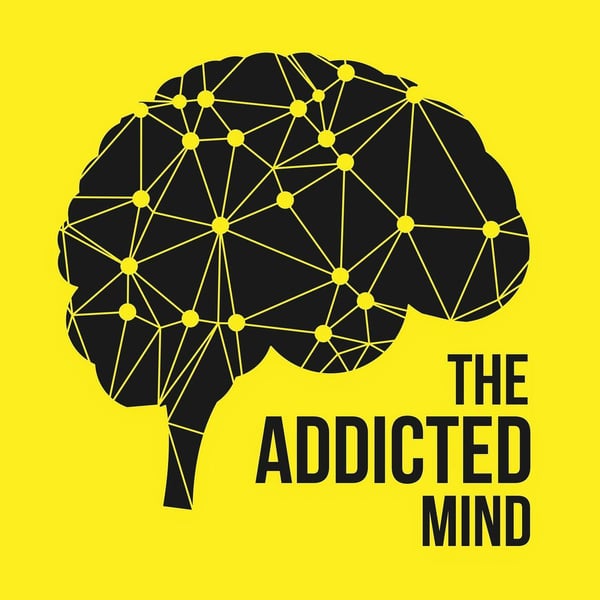35: Food Addiction & The Hunger Fix
The Addicted Mind Podcast
Duane Osterlind, LMFT
4.8 • 621 Ratings
🗓️ 12 April 2018
⏱️ 36 minutes
🧾️ Download transcript
Summary
On this episode of The Addicted Mind podcast, we are joined by Dr. Pam Peeke, a physician and scientist specializing in food addiction. Those struggling with food addictions fit into two categories: (1) people who practice disordered eating which eventually takes over all other aspects of their life, or (2) those who are recovering from another addiction and have turned to junk food and beverages as a transfer addiction.
Disordered eating and food addictions mainly revolve around the chemical effects of processed foods on the brain’s reward center, which releases dopamine and conveys the feeling of pleasure to the body. When people continue to eat junk food, the reward center of the brain becomes overwhelmed and reduces the number of receptors that can process the dopamine being released, so eventually the feeling of pleasure attained by the release of a certain amount of dopamine doesn’t feel as good as it once did, which makes the person want to consume more junk food in order to reach the desired level of high. The food industry knows that processed but hyper-palatable food acts as a drug to the brain, impairing the frontal cortex which controls decision-making and discipline, so they try to create food that will make consumers feel that “bliss point” and crave even more junk food.
Dr. Peeke has worked with registered dieticians to outline a plan in her book “The Hunger Fix” (link below) to empower people to switch out processed food with natural and whole foods and allow the brain to shift back to a healthy balance of active receptors so that people can adjust to feeling a natural high from eating healthy. While the first step of recovery is to eliminate processed foods from home, work, and your shopping list, a crucial second step is to seek help from a registered dietician and/or support and accountability from family and friends to get back into a healthy balance. A key to the recovery process from food addiction is to understand why food has this power over the person, and Dr. Peeke has found that it normally stems from some type of childhood or adolescent trauma, where food was the only life situation that the person could control, so they sought pleasure and safe haven there.
A helpful exercise for someone wondering if they have a tendency toward food addiction is to honestly answer these two questions:
- If I consume this food/beverage, will I feel out of control?
- If I consume this food/beverage, will I feel shame, blame, or guilt?
If the answer to these questions is “yes”, you should take a step back and evaluate the foods you are eating and seek a change.
Support this podcast at — https://redcircle.com/the-addicted-mind-podcast/donations
Learn more about your ad choices. Visit megaphone.fm/adchoices
See Privacy Policy at https://art19.com/privacy and California Privacy Notice at https://art19.com/privacy#do-not-sell-my-info.
Transcript
Click on a timestamp to play from that location
| 0:00.0 | Hello everyone. Welcome to Episode 35 of the Addicted Mind podcast. My name is Dwayne |
| 0:11.7 | Austerland and I'm your host and I'm also the co-founder of Novice Mindful Life Institute |
| 0:17.5 | Family Counseling and Recovery Center in Long Beach, California. |
| 0:21.8 | If you're struggling with addiction, please reach out to us. |
| 0:26.1 | We can help. |
| 0:27.2 | You can find more about us at theaddictedmind.com forward slash help. |
| 0:32.8 | So I'm very excited to introduce our next guest, Dr. Pamela Peek. She is author of the bestselling book, |
| 0:41.9 | The Hunger Fix, and she's going to come on today's show and talk about food addiction. Now, |
| 0:48.3 | this is an issue that is near and dear to my own heart, so it's very excited to have Dr. Pete |
| 0:53.4 | come on and talk about the brain science of food addiction. |
| 0:57.1 | And there's a lot of good information in this episode. |
| 1:00.1 | So I really hope you guys enjoy it. |
| 1:03.0 | Let's start this episode. |
| 1:15.0 | All right, everybody, welcome to the Addicted Mind podcast. |
| 1:20.0 | This is episode 35, and I have a wonderful guest today. |
| 1:31.4 | Her name is Dr. Peek, and she is author of The Hunger Fix, and it is a comprehensive book about the science of food addiction. |
| 1:37.0 | And Dr. Peek, I'm so excited to have you on the podcast today. You want to introduce yourself and talk a little bit about you as we get started? |
| 1:39.5 | Hey, thanks a lot. I'm really enjoying this because any time I get a chance to be able to help people understand |
| 1:47.2 | what's going on with themselves, especially when it comes to food addiction, it just gives me |
| 1:53.1 | nothing but pleasure. So my name is Dr. Pamela Peek, and I am a physician, scientist, a Pew Foundation scholar, and nutrition and metabolism, |
| 2:04.6 | and a fellow of the American College of Sports Medicine, because I like to really look at things |
| 2:09.6 | in a much more comprehensive lifestyle, healthy lifestyle way, so it's not just about what you put in your mouth, |
... |
Please login to see the full transcript.
Disclaimer: The podcast and artwork embedded on this page are from Duane Osterlind, LMFT, and are the property of its owner and not affiliated with or endorsed by Tapesearch.
Generated transcripts are the property of Duane Osterlind, LMFT and are distributed freely under the Fair Use doctrine. Transcripts generated by Tapesearch are not guaranteed to be accurate.
Copyright © Tapesearch 2025.

